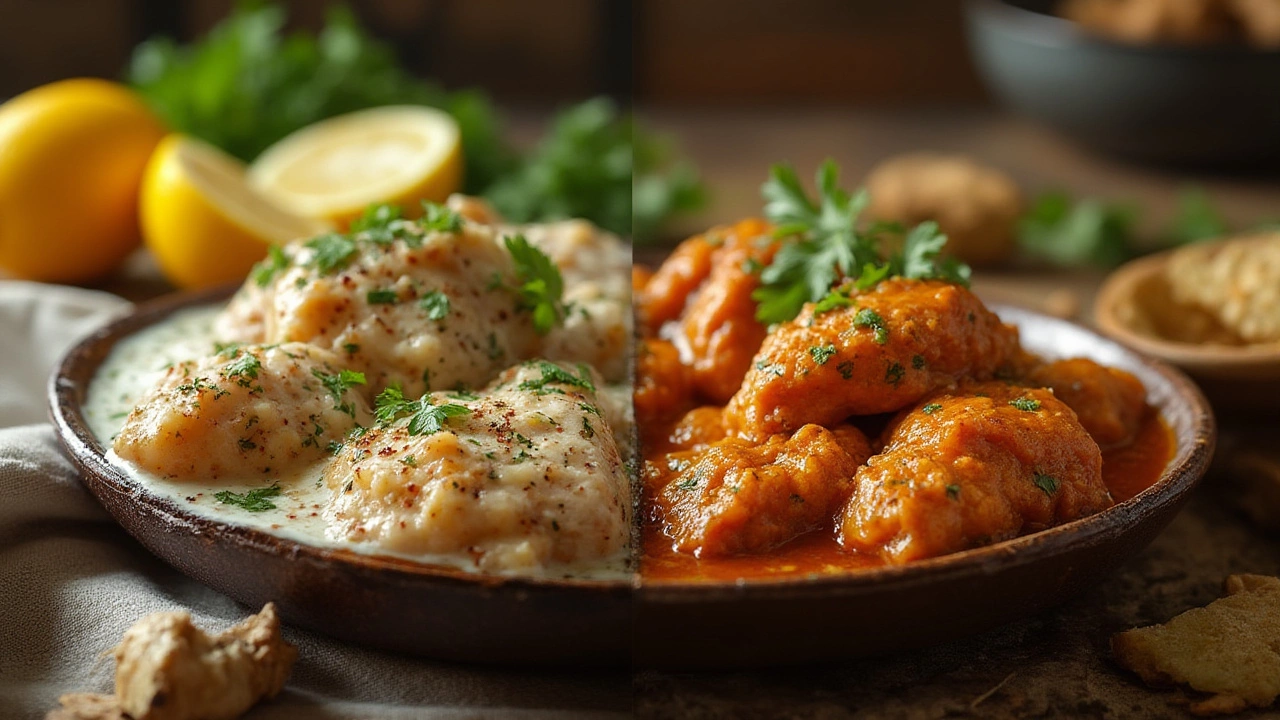Ever glanced at a chicken recipe and found yourself staring at Greek yogurt on the ingredient list, wondering if you could just use that tub of sour cream hiding in your fridge? If so, you’re definitely not alone. Kitchen swaps are part of real-life cooking—sometimes a happy accident, sometimes a panic moment when guests are due in an hour. But what actually happens if you use sour cream instead of Greek yogurt for marinating chicken? Will it taste the same, do the same job, or is it kitchen disaster territory? That’s not just a random thought; it’s a question that gets surprisingly spicy once you get into the science and taste test details. Ready for some flavor secrets?
The Science Behind Chicken Marinades
Chicken needs a little TLC to end up juicy and tasty, and that’s where marinades come in. The main trick behind most creamy marinades is using an acidic dairy ingredient (hello, Greek yogurt) to tenderize tough fibrous bits. Acids like lactic acid gently loosen up the chicken’s proteins, so they lose that rubbery feel and soak up flavor. Now, Greek yogurt is the ingredient you see in a shocking number of recipes for tandoori chicken, Greek souvlaki, or even classic grilled kebabs—there’s a reason for that. Plain Greek yogurt has about 0.9% lactic acid and a solid protein content (usually double that of regular yogurt). The result? Thicker texture, tangier flavor, and more punch for tenderizing meat.
So how does sour cream really stack up here? It’s not just yogurt with extra attitude—it’s a fermented cream that also packs lactic acid (but usually less than Greek yogurt, at about 0.7%, depending on brand). Sour cream has about 20% fat, while Greek yogurt generally hovers around 2–4% fat. Fat plays a sneaky role in marinades—it carries flavors and clocks in with a richer mouthfeel. But too much fat, like the amount found in sour cream, can create a barrier. The high fat content might block some of that tenderizing action since proteins and acids work best when they get direct access to the meat’s surface. So, using sour cream does tenderize, just a little slower and with a smoother, milder punch than Greek yogurt.
What about flavor? Sour cream has a creamy tang, just not as bold as Greek yogurt’s sharper, more assertive zip. This means a marinade made entirely with sour cream may not cut through with the same brightness, but you’ll still get some of that unique tartness. There are even folks who argue chicken marinated in sour cream gets an almost buttery vibe that Greek yogurt just can’t replicate. Science supports both: lactic acid works magic, but texture, fat content, and the slight pH change between yogurt and sour cream do shift your results. If you want your chicken less zippy, more mellow, sour cream is definitely up to the job.
Sour Cream and Greek Yogurt: Marinating Comparison Table
| Aspect | Greek Yogurt | Sour Cream |
|---|---|---|
| Lactic Acid Content | ~0.9% | ~0.7% |
| Fat Content | 2–4% | 20% |
| Texture | Thick, creamy, slightly grainy | Silky, extra rich |
| Tenderizing Power | Strong, quick | Gentle, slower |
| Flavor Impact | Sharp tang, hints of citrus | Mild tang, subtle buttery note |
| Allergy/Sensitivity Note | Lower lactose, less fat | Higher lactose, much higher fat |
This side-by-side gets real when you’re picking between them for nighttime grilling or fancy weekend dinners. If marinating time is tight—let’s say you have less than 2 hours—Greek yogurt will usually shine, getting a bit more of that desired tenderness and flavor. But if you want luscious, slightly richer chicken with mellow tang, reach for sour cream. Not all swaps are about “better.” Sometimes it’s just about different, and knowing what you’re after can flip the script on which comes out on top.

Practical Kitchen Tips: Getting the Best Out of Sour Cream Marinades
If you’re ready to try sour cream as your chicken marinade hero, a few small tricks can take your meal from “meh” to “whoa, let’s eat that again tomorrow.” Number one: watch your marinating time. Because sour cream works more gently and is fattier, it’s way less likely to turn chicken mushy. You can leave your chicken in a sour cream marinade overnight—a lifesaver if you’re prepping ahead for parties. With Greek yogurt, long soaks (over 6-8 hours) might take things a little too far and make the surface chalky.
Tip two: balance out the creaminess. Sour cream can get heavy, especially with spices. If you want a punchier marinade, add a splash of lemon juice or white vinegar. This not only perks up the acid but also helps tenderize with a little more “oomph.” Herbs like coriander, cumin, and black pepper go perfectly with sour cream’s subtle richness. And if you want to mimic some of that Greek yogurt tang, throw in a minced garlic clove or a teaspoon of Dijon mustard.
Worried your marinade might burn? You’re right to be careful. Sour cream, just like Greek yogurt, can catch and char quickly on high heat. For those beautiful grill marks minus the bitter, keep the heat medium or try indirect grilling. In the oven, go for a moderate temp—about 180°C (350°F)—and let the chicken rest after pulling it out so the juices settle.
Should you thin your sour cream first? Some brands are dense as spackle, and coating chicken can get tricky. Stir in a tablespoon of milk or buttermilk for a smoother spread (and a tiny bump in tang). Don’t forget salt—marinades without enough salt just won’t penetrate the meat deeply. Rule of thumb: at least 1 teaspoon of salt per cup of marinade for boneless chicken, a little more if you’re using bone-in pieces.
Leftover marinade? Don’t just toss it. If you’ve kept it uncontaminated (that is, not touching raw chicken), whisk it with a bit of olive oil for a salad dressing or serve as a cool sauce. If it’s touched raw meat, though, heat it up and let it simmer to kill any nasties before dunking your fries.
Flavor Expectations, Texture, and Popular Recipes
The million-dollar question: will chicken marinated with sour cream taste the same as one marinated with Greek yogurt? It’s not a carbon copy, but honestly, the difference can be a happy surprise. Sour cream gives the chicken a lush, velvety finish and a delicate tang. The surface stays smooth—no tiny yogurt clumps like you sometimes get—and it’s superb for pairing with strong spices, smoky paprika, or fresh herbs. If you grill or roast the chicken, that creaminess caramelizes, locking in juiciness and creating layers of flavor, not just on the skin but inside every bite.
If you’re cooking for picky eaters who hate “too much tang,” sour cream is your friend. The milder flavor doesn’t overwhelm, but it still adds moisture and a little zip without going full-on tart. For spice-forward dishes like tandoori-style chicken or Cajun-inspired barbecue, sour cream softens the blow of hot spices and helps the seasonings cling. Some home chefs have started using a 50:50 mix of Greek yogurt and sour cream, chasing that best-of-both-worlds sweet spot where you get extra silkiness and punchy tang.
Here are a few favorite recipe ideas where sour cream shines as a marinade:
- Sour Cream Ranch Chicken: Mix sour cream, fresh dill, garlic, and chopped chives; marinate chicken overnight; bake or grill for tender herby flavor.
- Spicy Sour Cream Tikka: Swap yogurt for sour cream in your favorite tikka marinade—think chili powder, cumin, coriander, ginger, and lemon juice.
- Lemon-Pepper Sour Cream Marinade: Whisk sour cream with fresh lemon zest, black pepper, and salt; perfect for chicken skewers or oven-roasted thighs.
- Crispy Baked Sour Cream Chicken: After marinating, coat chicken pieces in panko breadcrumbs and bake; the sour cream creates a tender, juicy bite under the crunch.
If you decide to experiment, trial out one piece first, then tweak. Some folks even go wild and toss sour cream with smoked paprika and honey for a marinade with surprising sweetness. The fat content in sour cream keeps the chicken juicy, even if you accidentally overcook a little.
Pro tip: For the easiest, most reliable substitute, always go for plain, full-fat sour cream. Low-fat versions are sometimes thinned with starches and gums and don’t give the same flavor or texture punch.

When to Pick Greek Yogurt and When to Use Sour Cream (And a Few Fun Facts)
So where does each really shine? Greek yogurt is the gold standard for recipes where you want a strong tang and extra protein—think Mediterranean-style marinades or sharp, earthy Indian dishes. If you’re calorie-counting or need something with less fat, Greek yogurt comes in handy and usually delivers a snappy, bright finish. It’s also just a little more “clingy”—so spices and herbs tend to hang on through the whole grilling process.
Sour cream is where it’s at if you want creamy meat or you’re marinating for a crowd that hates anything too tart or mouth-puckering. This is also the go-to for anyone lactose tolerant but not a fan of yogurt’s high protein kick (sometimes that makes the texture unexpectedly chalky). For certain Eastern European recipes or classic American ranch-style chicken, sour cream brings just the right balance. Fun fact: In Poland and neighboring countries, marinating meats in sour cream is more traditional than using yogurt—so it’s not really a “swap” there, more like the baseline.
Another fact: Commercial sour cream and Greek yogurt are pasteurized and cultured under controlled conditions, so they’re pretty safe marinating bases. If you’re in a hurry, Greek yogurt is quicker; if you want to prep ahead, sour cream buys you more wiggle room. Once cooked, both pair well with fresh salads, rice, or warm pita bread—or just slip the leftovers into sandwiches the next day.
Just remember: always keep your marinating chicken chilled and don’t reuse raw marinades without cooking. If you want to get geeky, there’s science out there showing lactic-acid-based marinades can reduce surface bacteria on chicken, especially when combined with classic spice blends.
In the end, your choice will depend on your taste buds, time constraints, and what’s actually on hand in your fridge. Don’t be afraid to play around. Some of the best kitchen stories and new recipes start with a swap just like this.
